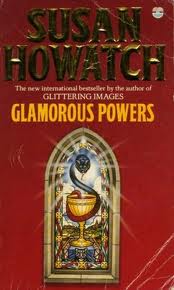 Glamorous Powers
Glamorous Powers
By Susan Howatch
Rating: 7 of 10
Having just finished the second in this Church of England series by Susan Howatch, I’m both enthralled and a little cautious with where this whole thing is going. I’m beginning to think that Howatch is primarily interested in the question of deception: self-deception and the deception of others. In both of the first two books, the main characters, Charles Ashworth and Jonathan Darrow, battle against both forms of deception primarily through the practice of confession to a spiritual director.
Howatch depicts in great detail the kinds of conversations that might happen between a directee and director. There is no Carl Rogers “unconditional positive regard” in these interactions. They resemble more a war of deception and anti-deception. The director asks questions, make statements, suggests interpretations, contradicts, encourages, argues, and more in an effort to tear down the deceptive defenses that the directee is building around him.
This kind of interaction is both grueling and seemingly self-destructive except for the commitment of the truth-telling Christian community that surrounds it. I’m enthralled with the depth of vulnerable relationships that develop between Ashworth (directee) and Darrow (director) in the first book, Glittering Images (reviewed here), and then turning things around between Darrow (directee) and Francis (director) in the second. I’m even a little more than enthralled. I’m envious. When was the last time you had someone ask you really hard questions about your motivations for doing something? I’m not talking about just one question, but several questions, over several days, even weeks. When were you really ever open to such a grueling examen? It does of course slow decision making down considerably! Reading these books is putting in me a desire for that kind of truth-telling Christian community and the practices of confession that sustain it.
And yet I am a little cautious with the end goal of where Howatch is taking this practice of truth-telling. The whole endeavor is so highly psychologized (sometimes explicitly so and other times implicitly) that one gets the impression that without years of psychoanalysis-like therapy one won’t find forgiveness and freedom in human relationships.
In each book the fundamental conflict for the main character turns out to be with his father (I wonder if that would hold true had the main characters been women rather than men?). It isn’t until the character recognizes this fundamental conflict and understands it clearly and fully that he is able to move forward with healthy relationships in the present. There is, I think, a great amount of wisdom in this idea, but there is also the potential of great danger too.
Howatch’s conception of “salvation” seems to be based in gaining the right knowledge about one’s past. The problem with this is that we can never gain complete knowledge about our past. Our self-understanding will always be finite. We can gain some understanding that will help us in the present, but there are always more and more layers of brokenness and sinfulness to be found, explored, catalogued, understood, and confessed. The good news of Jesus Christ is that we can be saved whether we understand all this or not. Salvation (not just from guilt but also from brokenness) is a gift of God’s grace that does come at times in the form of knowledge and understanding, but at other times God works whether we understand it or not.
There are moments where Darrow receives a gift of peace and forgiveness from God in a mystical kind of way that is separate from the knowledge gained in the practice of spiritual direction and confession, but the overarching thrust of both books tends toward knowledge of the past as salvation. Knowledge becomes the glamorous power rather than God’s grace.
Currently Reading/Listening:
The Shack by William P. Young
Following Jesus in a Culture of Fear by Scott Bader-Saye
Documents in Early Christian Thought edited by Wiles and Sante
Generation to Generation by Edwin H. Friedman
Turning Points by Mark Noll
Sacred Parenting by Gary Thomas
From Jesus to Constantine by Bart Ehrman
Essential Church by Thom S. Rainer and Sam S. Rainer
unChristian by David Kinnaman and Gabe Lyons
Unbroken by Laura Hillenbrand

Speak Your Mind
You must be logged in to post a comment.